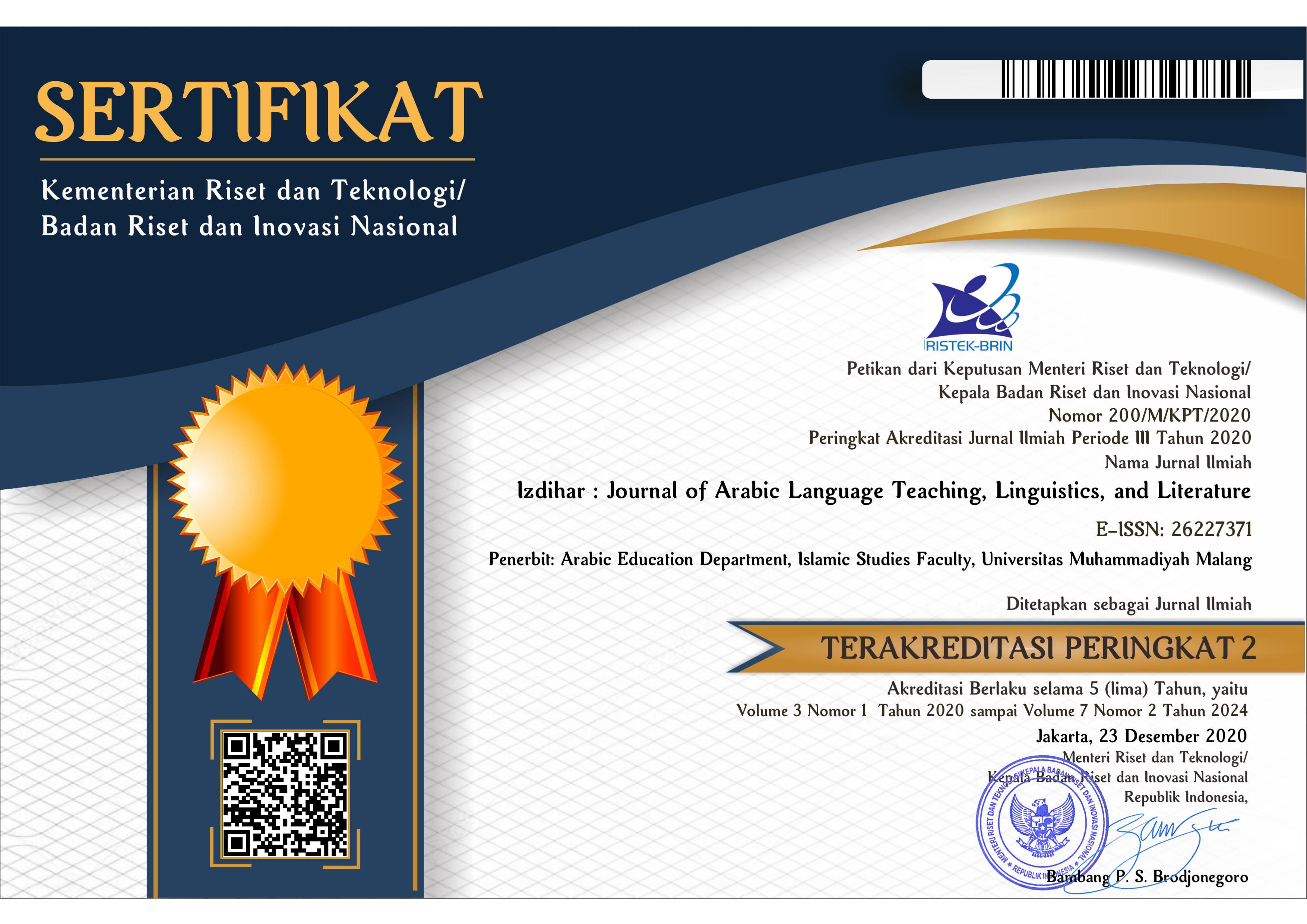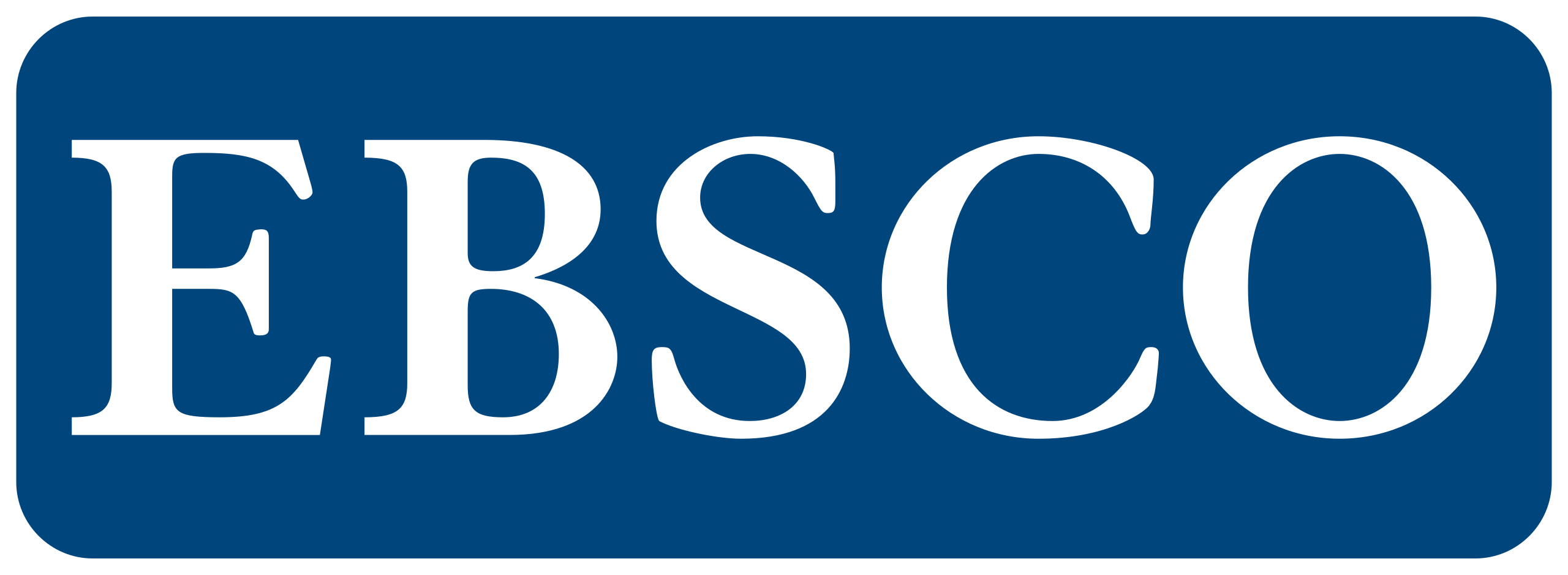تعليم اللغة العربية في المعهد السلفي و المعهد الحديث نماذجا
DOI:
https://doi.org/10.22219/izdihar.v1i2.7298Keywords:
Arabic Language, Islamic Boarding Schools, Ancestor, ModernAbstract
Islamic boarding schools are Islamic educational institutions that focus on moral education. Islamic boarding schools at this time were divided into ancestor and modern boarding schools. There are differences in the curriculum and learning models of Arabic in the two pesantren. Salaf Islamic boarding schools have a special curriculum in understanding the understanding of Islam. Learning Arabic in the Salaf Islamic boarding school is oriented towards grammatical learning by memorizing the terms nahwu and shorof and memorizing nadhom. While the Arabic language learning curriculum in modern pesantren aims not only for religious scholarship, but aims to use all language skills in communication. This Islamic boarding schools believes that language learning activities must provide students the ability to communicate correctly, both in oral and written form.Downloads
References
إبراهيم، عبد العليم. (1387 ه). الموجّه الفنى لمدرّسى اللغة العربيّة. القاهرة: دار المعارف.
إدرييس، نصر الدين. (2007). اتجاهات حديدة في مجال تعليم اللغة العربية في إندونيسيا. مجلة علمية إندونيسية إسلامية (Journal of Indonesian Islam) جزء 1 نمرة 2 ديسمبر.
الداليمي، طه علي حسين وإدرييس، سعاد عبد الكريم. (2009). اتجاهات حديثة في تدريس اللغة العربية. عمان: جدارا للكتاب العالمي.
زركشي، أحمد هداية الله. (2014). واقع تعليم اللغة العربية في المعاهد والمدارس بإندونيسيا. مجلة علمية لسان ضاد جزء 1 نمرة 2 أكتوبير.
الزركشي، أمل فتح الله. (2011). تجديد الفكر التربوي الإسلامي عند الشيخ إمام زركشي. مجلة علمية إندونيسية إسلامية (Journal of Indonesian Islam) جزء 5، نمرة 1 يونيو.
طعيمة، رشدي أحمد والناقة، محمود كامل. (2006). تعليم اللغة اتصاليا بين المناهج والاستراتيجيات. إيسيسكو: منشورات المنظمة الإسلامية للتربية والعلوم والثقافة.
عرفان، خالد محمود محمد. (2008). أحدث الاتجاهات في تعليم وتعلم اللغة العربية. الرياض: فهرسة مكتبة الملك فهد الوطنية أثناء النشر.
عوض، أحمد عبده. (1420 هـ). مداخل تعليم اللغة العربية: دراسة مسحية نقذية. نكة المكرمة: مكتبة الملك فهد الوطبية أثناء النشر.
الموسى، نهاد. (2003). الأساليب: مناهج ونماذج في تعليم اللغة العربية. عمان: دار الشروق.
وافي، علي عبد الواحد. (1983). اللغة والمجتمع. رياض: شركة عكاة للنشر والتوزيع.
Asy’ari, H. (2018a). المدخل الاتصالي في تعليم اللغة العربية. Al-Tadris: Jurnal Pendidikan Bahasa Arab, 06(01), 17–34.
Asy’ari, H. (2018b). خصائص اللغة العربية الفصحى ومكانتها في الدين الإسلامي. Jurnal Al Bayan, 10(1). Retrieved from http://ejournal.radenintan.ac.id/index.php/albayan/article/view/2595
Bahruddin, Uril. (2016). Bisa Bahasa Arab: Bukan Hanya Mimpi. Jakarta: Tartil Institute.
Dhofier, Zamakhsyari. (2001). Tradisi Pesantren. Jakarta: LP3ES.
Madjid, Nurcholis. (1997). Bilik-Bilik Pesantren; Sebuah Potret Perjalanan. Jakarta: Paramadina.
________________, (1997). Islam, Kemodernan, dan Keindonesiaan. Bandung: Mizan.
Mastuhu. (1994). Dinamika Sistem Pendidikan Pesantren. Jakarta: INIS.
Mochtar, Affandi. (2009). Kitab Kuning & Tradisi Akademik Pesantren. Bekasi: Pustaka Isfahan.
Munir. (2017) Perencanaan Sistem Pengajaran Bahasa Arab; Teori dan Praktik. Jakarta: Kencana.
Mutohar, Ahmad & Anam, Nurul. (2013). Manifesto Modernisasi Pendidikan Islam & Pesantren. Yogyakarta: Pustaka Pelajar.
Nababan, PWJ. (1993). Sosiolinguistik: Suatu Pengantar. Jakarta: Gramedia Pustaka Utama.
Tamam, Baddrut. (2015). Pesantren: Nalar Dan Tradisi. Yogyakarta: Pustaka Pelajar.
Pateda, Mansoer. (2015). Sosiolinguistik. Bandung: Angkasa.
Qomar, Mujamil. Pesantren: Dari Transformasi Metodologi Menuju Demokratisasi Institusi. Jakarta: Erlangga.
Sekretariat Negara RI. (2003). Undang-Undang Nomor 20 Tahun 2003 Tentang Sistem Pendidikan Nasional. Jakarta: 8 Juli.
Soeparno. (2013) Dasar-Dasar Linguistik Umum. Yogyakarta: Tiara Wacana.
Tuanaya, A Malik M. Thaha, dkk. (2007). Modernisasi Pesantren. Jakarta: Balai Penelitian dan Pengembangan Agama Jakarta.
Yunus, Mahmud. (1979). Sejarah Pendidikan Islam di Indonesia. Jakarta: Mutiara.
Downloads
Published
How to Cite
Issue
Section
License
Copyright Notice
Authors who publish with this journal agree to the following terms:
- Authors retain copyright and grant the journal right of first publication with the work simultaneously licensed under a Creative Commons Attribution-ShareAlike 4.0 International License that allows others to share the work with an acknowledgment of the work's authorship and initial publication in this journal.
- Authors are able to enter into separate, additional contractual arrangements for the non-exclusive distribution of the journal's published version of the work (e.g., post it to an institutional repository or publish it in a book), with an acknowledgment of its initial publication in this journal.
- Authors are permitted and encouraged to post their work online (e.g., in institutional repositories or on their website) prior to and during the submission process, as it can lead to productive exchanges, as well as earlier and greater citation of published work (See The Effect of Open Access).
Copyright (c) 2019 Izdihar : Journal of Arabic Language Teaching, Linguistics, and Literature

This work is licensed under a Creative Commons Attribution-ShareAlike 4.0 International License.


















